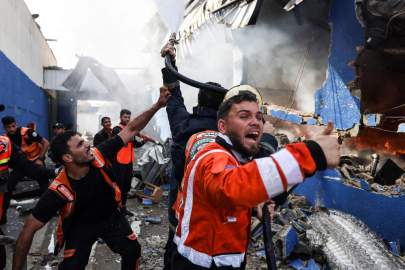After Gaza’s Deadliest Day, Israel Says It Is Targeting Hamas Tunnels

TEL AVIV—Israel launched more airstrikes Monday in the Gaza Strip, targeting what its military said was a tunnel network used by Hamas, as it tries to blunt the militant group’s ability to attack Israeli territory.
The two sides continued to trade fire despite international calls to bring the fighting to an end.
The Israeli military said assaults with warplanes hit roughly 60 miles of underground passageways that it says are used to ferry weapons and fighters across Gaza. Israel has dubbed the subterranean network Hamas’s “metro.” The military also said it thwarted a potential Hamas underwater attack into Israeli territory with a submerged vessel and killed a senior commander in the Palestinian Islamic Jihad, another armed group in Gaza that confirmed the killing.
Yahya al-Sarraj, the mayor of Gaza City, the strip’s biggest population center, said the strikes hadn’t targeted military positions and instead hit roads and civil infrastructure, setting the economy back years. He called the strikes collective punishment and asked the international community to stop assaults on vital infrastructure in Gaza.
Hamas also fired scores more rockets toward Israel overnight and Monday, causing light injuries, the Israeli military said.
Prime Minister Benjamin Netanyahu has said Israel will continue to strike positions in Gaza until it has degraded Hamas’s military capabilities and hurt its capacity to wage attacks against Israelis. Mr. Netanyahu has described Hamas’s decision to launch rockets toward Jerusalem a week ago as a red line, adding that the military campaign will take time.
So far, diplomatic efforts to end the fighting have made little visible headway. In recent days, U.S. Deputy Assistant Secretary of State Hady Amr has held meetings in Israel while Secretary of State Antony Blinken has phoned counterparts in Egypt, Pakistan, Saudi Arabia and Qatar, calling for a cease-fire.
In a press briefing from Copenhagen Monday, Mr. Blinken said the issue of a cease-fire was between Israel and Hamas, but that the U.S. is working “around the clock” through diplomatic channels to end the conflict between the two warring parties. The Gaza ruler is designated a terrorist organization by the U.S. Mr. Blinken reiterated Washington’s stance that Israel has “a right to defend itself” but added that it also has an obligation to prevent civilian casualties.
Hamas’s political leader Ismail Haniyeh said in an interview published Monday in the Lebanese newspaper Al Akhbar that Egypt, Qatar, Russia and the U.N. have contacted Hamas as part of efforts to reach a cease-fire. Mr. Haniyeh said his group would only accept a solution that “rises to the sacrifices put forward by the Palestinian people.”
In total, 200 people, including 59 children and 35 women, have been killed in Gaza since last Monday, according to the Palestinian health ministry. In Israel, 11 people, including one child, have been killed, according to Israel’s emergency response service and military.
“What is happening is the brutal killing of citizens and this is a crime against humanity,” Hamas spokesman Abed Al Lateef al Kanoo said in a statement.
Israel has launched scores of attacks it says are targeting Hamas, but it has provided little evidence to back those claims. Many of those strikes have caused civilian casualties. Israel says it has aborted hundreds of airstrikes to avoid harming civilians and that Hamas leans on the Gaza health ministry to inflate deaths of women and children and put diplomatic pressure on Israel.
As part of its campaign, the Israeli military said early Monday it blew up the homes of nine Hamas commanders in a strategy to kill the militant group’s operatives and demoralize the senior leadership. Israel has said that it has killed at least 130 Hamas militants.
Gaza’s government ministries said the blasts leveled roughly 1,000 homes, damaging 6,000 more and about 35 schools. Authorities said destruction of roads, agriculture and energy facilities amounted to tens of millions of dollars, including the wrecking of an ice-cream plant and plastics factory. The General Directorate of Civil Defense, the body responsible for emergency services in Gaza, said bombings hit a sponge factory in the northern Gaza Strip, causing fires that risked spreading to houses and dragged resources away from other more-needed areas.
“We have indeed struck roads, not in order to strike roads, but in order to strike Hamas military infrastructure built under it,” said Jonathan Conricus, an Israeli military spokesman.
Israel identified Hamas’s underground tunnel network as a threat during the last significant round of fighting in 2014, prompting the Israeli military to launch a ground invasion of Gaza to find and destroy passageways leading into Israeli territory.
On Monday, an Israeli air force official said the destruction of the tunnels, which came only after Israel had targeted Hamas’s rocket manufacturing and launching capabilities first, was meant to force Hamas militants above ground, making it easier for the Israeli military to prevent their attacks against Israeli civilians.
“It’s an important part of how you fight Hamas, which has dug hundreds of kilometers of tunnels underground,” the official said, adding that the Israeli air force was hitting “choke points” rather than the entire tunnel system.
The air force official said Hamas still had enough missiles and the ability to continue attacking Israel for a long time. Militants have fired more than 3,200 rockets at Israel since the conflict began last Monday.
Israeli officials have said their campaign had made significant gains, including destroying all of Hamas and Palestinian Islamic Jihad’s rocket manufacturing sites. There were 31 such sites and Israel believes the groups won’t be able to produce more rockets in the short term.
Internal violence between Israeli Jews and Arabs that racked the country in recent days appeared to be dissipating Monday, Israeli officials said. The Israeli police said they had responded to more than 40,000 incidents and carried out over 900 arrests over the past week.
Source: https://www.wsj.com/articles/after-gazas-deadliest-day-israel-says-it-is-targeting-hamas-tunnel-network-11621247985?mod=hp_lead_pos5




